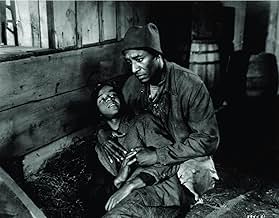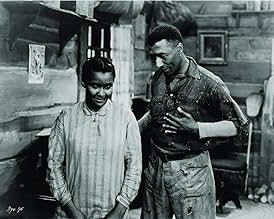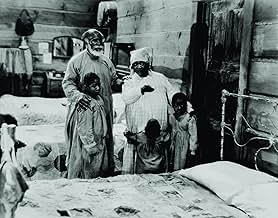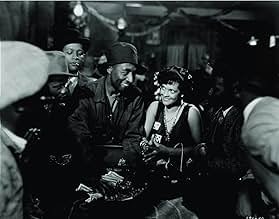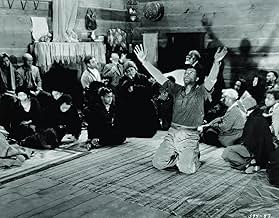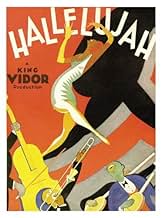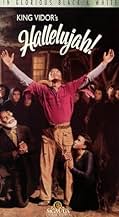VALUTAZIONE IMDb
6,7/10
2139
LA TUA VALUTAZIONE
Aggiungi una trama nella tua linguaA sharecropper decides to become a preacher after falling for a vamp from the city.A sharecropper decides to become a preacher after falling for a vamp from the city.A sharecropper decides to become a preacher after falling for a vamp from the city.
- Regia
- Sceneggiatura
- Star
- Candidato a 1 Oscar
- 3 vittorie e 1 candidatura in totale
Matthew 'Stymie' Beard
- Child
- (non citato nei titoli originali)
Evelyn Pope Burwell
- Singer
- (non citato nei titoli originali)
Eddie Conners
- Singer
- (non citato nei titoli originali)
William Allen Garrison
- Heavy
- (non citato nei titoli originali)
Eva Jessye
- Singer
- (non citato nei titoli originali)
Sam McDaniel
- Adam
- (non citato nei titoli originali)
Clarence Muse
- Church Member
- (non citato nei titoli originali)
Recensioni in evidenza
I probably don't need to go into the historical facts about this movie or the plot, as this had probably been expunded in numerous other comments. Personally I think that Hallelujah is a beautiful and powerful film, sympathetic to African Americans, and I think it's remarkable that it was produced at all.
Hallelujah is a huge production, with hundreds of extras. The cast was made up of mostly unknowns. Cast members like Fally Belle McKnight and Victoria Spivey apparently never made any other films, and leads Daniel L. Haynes and Nina Mae McKinney were obviously getting started. The cast is very good, I thought, especially Spivey (a veteran of the stage) as Rose. Haynes is okay in the beginning, seeming a little uneven in his role as well-meaning rogue Zeke, but the final scenes allow him to prove the commanding presence he could muster as an screen presence. Nina Mae McKinney is a power-house. A short, curvy beauty with an interesting voice, she has something of a young Myrna Loy. In fact, I just recently saw a still from a Loy film called The Squall where Loy looks an awful lot like McKinney.
Movies like Hallelujah are an acquired taste. When I first saw it, I was distracted by the crudeness of the sound, the jagged editing and the overall unevenness of the movie. Sure, two or three years later, Hollywood was turning out glossy productions like Red Dust and Blond Venus, with highly polished editing, clear sound and more mobile camera-work, but this is 1929. Sound film-making techniques had yet to be smoothed out. The crinkles of a young process actually add charm to this film, if you know to expect them.
I'll admit as well that, when I first saw Hallelujah, I was irritated by the voices. There's a lot of screeching from the women, and a great deal of mumbling as well. A second viewing, though, allows one to see past these "irritating" aspects and appreciate the voices for what they are. This way, Fanny Belle McKnight's agonized cries of sorrow and her singing the children to sleep is more touching than it is grating.
It's hard to know what else to say about the film. For all it's shortcomings, it's a touching film, lyrical even. I think it's a wonderful production, and I doubt it would not have been made much differently by a black director. Plus, one must agree, King Vidor was a far better craftsman than Oscar Micheaux. 9/10
Hallelujah is a huge production, with hundreds of extras. The cast was made up of mostly unknowns. Cast members like Fally Belle McKnight and Victoria Spivey apparently never made any other films, and leads Daniel L. Haynes and Nina Mae McKinney were obviously getting started. The cast is very good, I thought, especially Spivey (a veteran of the stage) as Rose. Haynes is okay in the beginning, seeming a little uneven in his role as well-meaning rogue Zeke, but the final scenes allow him to prove the commanding presence he could muster as an screen presence. Nina Mae McKinney is a power-house. A short, curvy beauty with an interesting voice, she has something of a young Myrna Loy. In fact, I just recently saw a still from a Loy film called The Squall where Loy looks an awful lot like McKinney.
Movies like Hallelujah are an acquired taste. When I first saw it, I was distracted by the crudeness of the sound, the jagged editing and the overall unevenness of the movie. Sure, two or three years later, Hollywood was turning out glossy productions like Red Dust and Blond Venus, with highly polished editing, clear sound and more mobile camera-work, but this is 1929. Sound film-making techniques had yet to be smoothed out. The crinkles of a young process actually add charm to this film, if you know to expect them.
I'll admit as well that, when I first saw Hallelujah, I was irritated by the voices. There's a lot of screeching from the women, and a great deal of mumbling as well. A second viewing, though, allows one to see past these "irritating" aspects and appreciate the voices for what they are. This way, Fanny Belle McKnight's agonized cries of sorrow and her singing the children to sleep is more touching than it is grating.
It's hard to know what else to say about the film. For all it's shortcomings, it's a touching film, lyrical even. I think it's a wonderful production, and I doubt it would not have been made much differently by a black director. Plus, one must agree, King Vidor was a far better craftsman than Oscar Micheaux. 9/10
A film that has a lot to unpack, and a lot to consider. It was made with an all-black cast by director King Vidor with what I believe were good intentions, has some fantastic performances, and tells a good story, but it touches a nerve with its stereotypes. What was liberal in 1929 is known to be backwards today, and this is what makes it such a complicated film. I enjoyed it for its positives and would suggest viewers not dismiss the film entirely, but I'll start with acknowledging the problematic parts, at least the way I see them, FWIW.
As African-American intellectuals like Lorraine Hansberry, James Baldwin, and others explained it so well in the late 1950's, one of the mechanisms white Americans used to cope with the outrageous horror of slavery after it ended was to continue thinking of blacks as somehow different than human. An outright racist considered them lesser, inferior beings. Well-intentioned liberals often embraced the idea that they were a simple, rhythmical people, steeped in Christianity, and possessing a deep wellspring of forgiveness. This reduced the collective guilt over a horror which simply could not be faced, and which to this day has not been reconciled. The liberal view of the day, what we see manifested in this film, is of course preferable to what we might see from someone like D.W. Griffith, but either characterization is dangerous, and robs African-Americans of their humanity.
In the film, the characters are way too happy being poor and picking cotton. I mean, it's better than 'Gone with the Wind', where they're happy to be the slaves of masters who are portrayed as benevolent and genteel, but it still falls into the trap of thinking of them as just simple folk who like to dance after a long day in the field. See, they're all free and happy now, slavery is over, and we certainly don't need to think about some form of reparations for our part in 300+ years of slavery and the death of upwards of 100 million Africans. The film is trying to give its mostly white audience a window into African-American life, similar to how the 'expedition' films from the period presented Polynesians, Inuits, etc ... many of which were made with cultural condescension, and it's telling that there are no white characters, discriminating against them or terrorizing them, as if they were in their own little bubble, or on an island somewhere. And unfortunately, coming along with the singing, dancing, and revival preaching are stereotypes. One of the worst is in the way the main character (Daniel L. Haynes) simply cannot control himself around women, and one (Nina Mae McKinney) in particular. Even though we may see some of that in white individuals from other films (Lionel Barrymore as a preacher in 'Sadie Thompson' from 1928 comes to mind), here it's associated with such a negative stereotype, the sexual aggressiveness of black men, and amplified by Haynes's eyes twitching in tight shots.
On the other hand, I think we have to give the film and Vidor some credit too. To make his first sound picture with an all-black cast is impressive. The main story line could have been based on white characters, and we see a range of human emotion and folly. The musical performances and the dancing from the main characters and various others are excellent. Daniel L. Haynes has quite a presence, and his deep voice and preaching style might just convert you if you're not careful. I loved his imitating a train chugging down the tracks in one of his sermons. Nina Mae McKinney is a revelation too - so well-cast, conveying depravity, wildness, deceit, and contrition all very well. It's all the more impressive considering she was just 17 years old when the film came out, and 16 when it was filmed. The acting is a little uneven, consistent for the period, but one thing I noticed was that the performances are uniformly less reserved and restrained, and that along with pretty damn good sound quality results in more energy and vibrancy on the screen - especially as it compares to other early talkies in 1929 and 1930, many of which are incredibly creaky and brittle. I had a little bit of the same feeling I had about 'Stormy Weather' (1943), another film containing stereotypes, that the performances transcended the narrow framework they were placed in.
Because of all of the concerns about race, I think some of Vidor's great shots in the film get overlooked. He shows us the cotton ginning process, and Haynes up on a huge lumber saw cutting long boards from a tree. He gives a shot of a fantastic drummer in a ragtime band, throwing and catching his sticks as he plays. He shows us the orgiastic gyrations of a wild church scene with excellent camera work, and gives us a chase through a swamp that was likely influential to other filmmakers. Lastly, while McKinney's character falls into the age-old (and misogynistic) temptress type, we also see that she can take care of herself, in one scene beating the hell out of a guy with a fireplace poker after he tries to force himself on her, which despite the violence was frankly great to see.
The bottom line though ... was this film a step forward? That's hard for me to answer. It's worth seeing and the dialog which probes a little deeper than the extreme positions (e.g. distilling it down to "old-timey racism" or "what's the problem, there's no racism here") is worthwhile. If you want to get a better window into the African-American experience from this period, however, you should check out 'Within Our Gates' (1920) by director Oscar Micheaux.
As African-American intellectuals like Lorraine Hansberry, James Baldwin, and others explained it so well in the late 1950's, one of the mechanisms white Americans used to cope with the outrageous horror of slavery after it ended was to continue thinking of blacks as somehow different than human. An outright racist considered them lesser, inferior beings. Well-intentioned liberals often embraced the idea that they were a simple, rhythmical people, steeped in Christianity, and possessing a deep wellspring of forgiveness. This reduced the collective guilt over a horror which simply could not be faced, and which to this day has not been reconciled. The liberal view of the day, what we see manifested in this film, is of course preferable to what we might see from someone like D.W. Griffith, but either characterization is dangerous, and robs African-Americans of their humanity.
In the film, the characters are way too happy being poor and picking cotton. I mean, it's better than 'Gone with the Wind', where they're happy to be the slaves of masters who are portrayed as benevolent and genteel, but it still falls into the trap of thinking of them as just simple folk who like to dance after a long day in the field. See, they're all free and happy now, slavery is over, and we certainly don't need to think about some form of reparations for our part in 300+ years of slavery and the death of upwards of 100 million Africans. The film is trying to give its mostly white audience a window into African-American life, similar to how the 'expedition' films from the period presented Polynesians, Inuits, etc ... many of which were made with cultural condescension, and it's telling that there are no white characters, discriminating against them or terrorizing them, as if they were in their own little bubble, or on an island somewhere. And unfortunately, coming along with the singing, dancing, and revival preaching are stereotypes. One of the worst is in the way the main character (Daniel L. Haynes) simply cannot control himself around women, and one (Nina Mae McKinney) in particular. Even though we may see some of that in white individuals from other films (Lionel Barrymore as a preacher in 'Sadie Thompson' from 1928 comes to mind), here it's associated with such a negative stereotype, the sexual aggressiveness of black men, and amplified by Haynes's eyes twitching in tight shots.
On the other hand, I think we have to give the film and Vidor some credit too. To make his first sound picture with an all-black cast is impressive. The main story line could have been based on white characters, and we see a range of human emotion and folly. The musical performances and the dancing from the main characters and various others are excellent. Daniel L. Haynes has quite a presence, and his deep voice and preaching style might just convert you if you're not careful. I loved his imitating a train chugging down the tracks in one of his sermons. Nina Mae McKinney is a revelation too - so well-cast, conveying depravity, wildness, deceit, and contrition all very well. It's all the more impressive considering she was just 17 years old when the film came out, and 16 when it was filmed. The acting is a little uneven, consistent for the period, but one thing I noticed was that the performances are uniformly less reserved and restrained, and that along with pretty damn good sound quality results in more energy and vibrancy on the screen - especially as it compares to other early talkies in 1929 and 1930, many of which are incredibly creaky and brittle. I had a little bit of the same feeling I had about 'Stormy Weather' (1943), another film containing stereotypes, that the performances transcended the narrow framework they were placed in.
Because of all of the concerns about race, I think some of Vidor's great shots in the film get overlooked. He shows us the cotton ginning process, and Haynes up on a huge lumber saw cutting long boards from a tree. He gives a shot of a fantastic drummer in a ragtime band, throwing and catching his sticks as he plays. He shows us the orgiastic gyrations of a wild church scene with excellent camera work, and gives us a chase through a swamp that was likely influential to other filmmakers. Lastly, while McKinney's character falls into the age-old (and misogynistic) temptress type, we also see that she can take care of herself, in one scene beating the hell out of a guy with a fireplace poker after he tries to force himself on her, which despite the violence was frankly great to see.
The bottom line though ... was this film a step forward? That's hard for me to answer. It's worth seeing and the dialog which probes a little deeper than the extreme positions (e.g. distilling it down to "old-timey racism" or "what's the problem, there's no racism here") is worthwhile. If you want to get a better window into the African-American experience from this period, however, you should check out 'Within Our Gates' (1920) by director Oscar Micheaux.
Nina Mae McKinney portrayed Chick in this movie. The untrained, natural singing, dancing, acting talent stole everyone's heart who saw this movie, even till this day she's still winning hearts. A great actress, after this movie people named her "The Black Garbo" and "The Dark Clara Bow". Being the first black actress, she had to represent her race well, and show that Blacks could act, and show Hollywood that Blacks could hold their own on the silver screen. Norma Shearer, John Gilbert, Irving Thalberg, and King Vidor was breath-taken by her acting, and after her you saw many white actresses copying her style, the hands on the hips and facial expressions. This movie isn't stereotypical at all, its about Black Life in the South, the music and styles of the time. Nina Mae was promised many more movies, but never did anything else, but singing apperances, shorts, and maid apperances. But she did get to show her acting in the independent black movies. If you ever get to see them, you won't be sorry. People say this movie was ahead of its time, maybe so, But Nina was lucky she got to show all her talents, singing, dancing, comedy, and acting. Even Blacks don't get to show all of that today. People say that Lena Horne opened the doors, thats false, Nina Mae McKinney did, representing the Black race well, and showing that we could act, open the doors for Blacks in the future in Hollywood.
It's important to realize this was only the first year of sound pictures. Seen in that light, HALLELUJAH! has a remarkable fluidity, and a freedom from the tyranny of the sound camera that is little short of astonishing. (See "Singin' in the Rain" for a realistic depiction of this problem.) The acting is on a high level, if somewhat dated. King Vidor did an admirable job in depicting his characters' life condition, and was deservedly nominated as Best Director of 1929/30.
"Hallelujah!" is fascinating from a film history perspective. King Vidor created the first Hollywood film with an all-black cast, and depicted in almost documentary fashion what life was like for poor blacks living in America's deep South. Alas, any interest the film held for me was purely academic -- as a film, it's otherwise rather boring.
The nominal plot focuses on Zeke, who lives with his large family and helps with their cotton-picking business. We watch him struggle with the demons that plague mortal man -- like gambling and horniness -- give into them, repent, give into them again, repent, and so on, until he comes back at the end to the family who loves him. Indeed, family and religion are the two dominant pillars around which these poor folk anchor themselves, much as they are in any culture. Much of the film consists of long scenes depicting a sermon, a baptism, a local dance. There are countless scenes of characters lifting their hands to heaven, praying to Jesus to guide them. It's all rather dramatically inert, and the film is too long. If you are religious yourself, I imagine these scenes might have a certain power to them. I found all of the weeping and wailing tiresome after a while.
Credit must go to Vidor, though, for even bothering to make this film at a time when much of America didn't care all that much about the black people. The movie is a memento of the role film can play in leading cultural progress.
Grade: C+
The nominal plot focuses on Zeke, who lives with his large family and helps with their cotton-picking business. We watch him struggle with the demons that plague mortal man -- like gambling and horniness -- give into them, repent, give into them again, repent, and so on, until he comes back at the end to the family who loves him. Indeed, family and religion are the two dominant pillars around which these poor folk anchor themselves, much as they are in any culture. Much of the film consists of long scenes depicting a sermon, a baptism, a local dance. There are countless scenes of characters lifting their hands to heaven, praying to Jesus to guide them. It's all rather dramatically inert, and the film is too long. If you are religious yourself, I imagine these scenes might have a certain power to them. I found all of the weeping and wailing tiresome after a while.
Credit must go to Vidor, though, for even bothering to make this film at a time when much of America didn't care all that much about the black people. The movie is a memento of the role film can play in leading cultural progress.
Grade: C+
Lo sapevi?
- QuizAlthough this film is frequently touted as the first black-cast film produced in Hollywood, it is actually predated by the more obscure Hearts in Dixie (1929).
- BlooperWhen Zeke confronts Chick and Hot Shot and strong-arms them in front of the crowd, the shadow of the microphone falls across Hot Shot as he is pushed to the background of the scene and tries to regain his composure. The shadow of the boom is also visible falling across the extras behind him.
- Versioni alternativeMGM also issued this movie in a silent version, with Marian Ainslee writing the titles.
- Colonne sonoreSometimes I Feel Like a Motherless Child
(uncredited)
Traditional Spiritual
Sung offscreen during the opening credits
I più visti
Accedi per valutare e creare un elenco di titoli salvati per ottenere consigli personalizzati
- How long is Hallelujah?Powered by Alexa
Dettagli
- Tempo di esecuzione1 ora 49 minuti
- Colore
- Proporzioni
- 1.20 : 1
Contribuisci a questa pagina
Suggerisci una modifica o aggiungi i contenuti mancanti



